大学英语presentation制作范例-介绍专业医生ppt课件
- 格式:ppt
- 大小:1.24 MB
- 文档页数:10


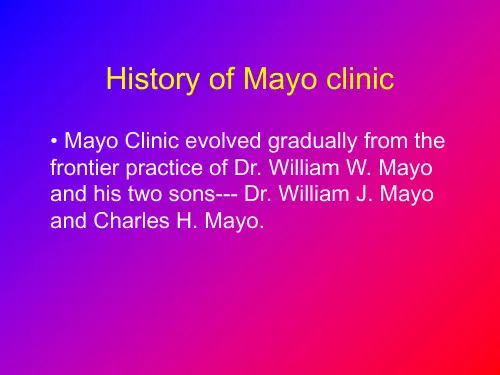
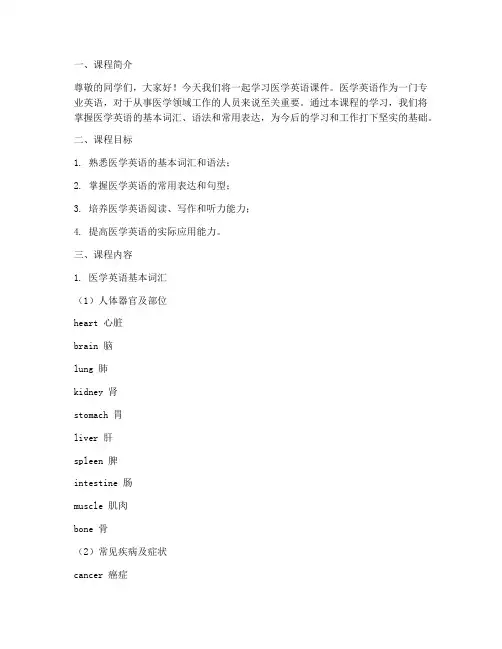
一、课程简介尊敬的同学们,大家好!今天我们将一起学习医学英语课件。
医学英语作为一门专业英语,对于从事医学领域工作的人员来说至关重要。
通过本课程的学习,我们将掌握医学英语的基本词汇、语法和常用表达,为今后的学习和工作打下坚实的基础。
二、课程目标1. 熟悉医学英语的基本词汇和语法;2. 掌握医学英语的常用表达和句型;3. 培养医学英语阅读、写作和听力能力;4. 提高医学英语的实际应用能力。
三、课程内容1. 医学英语基本词汇(1)人体器官及部位heart 心脏brain 脑lung 肺kidney 肾stomach 胃liver 肝spleen 脾intestine 肠muscle 肌肉bone 骨(2)常见疾病及症状cancer 癌症diabetes 糖尿病heart disease 心脏病asthma 哮喘flu 流感cold 咳嗽headache 头痛fever 发烧nausea 恶心dizziness 头晕2. 医学英语语法(1)时态一般现在时:表示现在经常性或习惯性的动作或存在的状态;一般过去时:表示过去某个时间发生的动作或存在的状态;一般将来时:表示将来某个时间将要发生的动作或存在的状态;现在进行时:表示现在正在进行的动作;过去进行时:表示过去某个时间正在进行的动作;将来进行时:表示将来某个时间将要进行的动作。
(2)语态被动语态:表示主语是动作的承受者。
3. 医学英语常用表达(1)询问病情How are you feeling today?How is your condition?Can you describe your symptoms?Are you experiencing any pain?Do you have any allergies?(2)诊断疾病Based on your symptoms, I believe you have a cold. Your blood pressure is normal.Your heartbeat is irregular.Your blood sugar level is high.You have an infection in your lung.(3)治疗建议Please take this medicine three times a day.You need to rest more and drink plenty of water. You should have surgery to remove the tumor.It's important to follow the doctor's instructions.四、课堂练习1. 请同学们用所学词汇和语法完成以下句子:I ___________ (have) a headache this morning.She ___________ (be) a doctor.He ___________ (get) up at 6:00 a.m. every day. They ___________ (go) to the hospital last week. 2. 请同学们用所学表达回答以下问题:How are you feeling today?Can you describe your symptoms?What should I do if I have a fever?五、课后作业1. 请同学们查阅资料,了解以下疾病的英文表达:a. 心脏病b. 糖尿病c. 癫痫d. 癌症2. 请同学们用所学知识写一篇关于医学英语的短文,字数不少于300字。
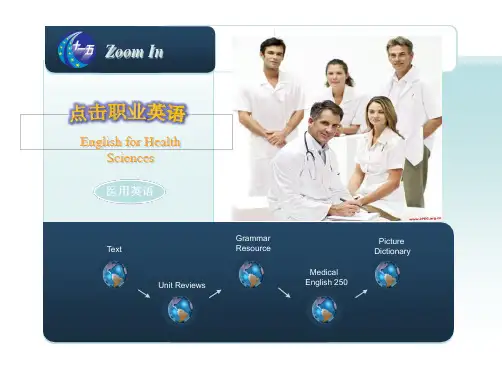

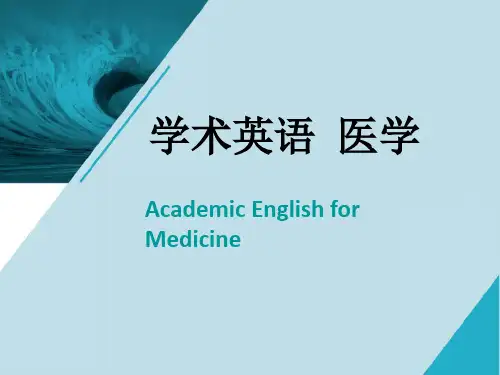

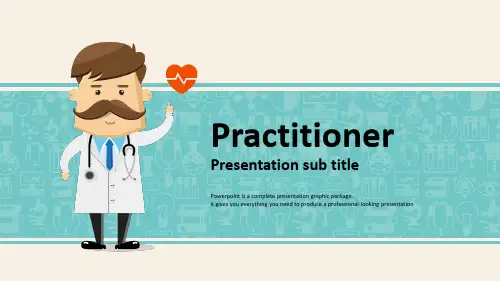
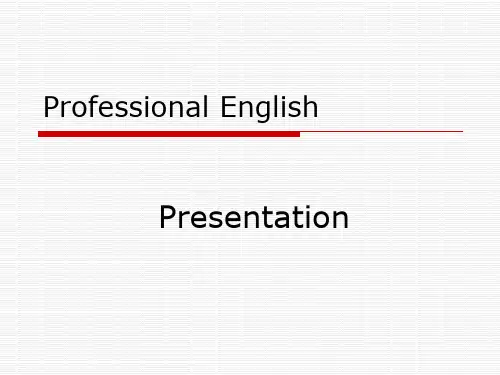
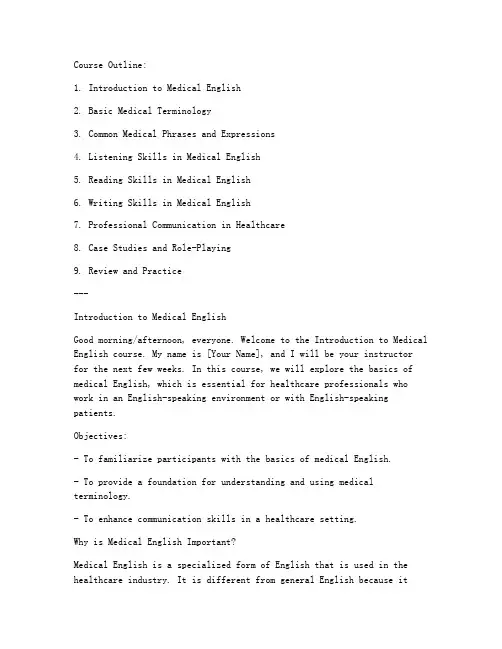
Course Outline:1. Introduction to Medical English2. Basic Medical Terminology3. Common Medical Phrases and Expressions4. Listening Skills in Medical English5. Reading Skills in Medical English6. Writing Skills in Medical English7. Professional Communication in Healthcare8. Case Studies and Role-Playing9. Review and Practice---Introduction to Medical EnglishGood morning/afternoon, everyone. Welcome to the Introduction to Medical English course. My name is [Your Name], and I will be your instructorfor the next few weeks. In this course, we will explore the basics of medical English, which is essential for healthcare professionals who work in an English-speaking environment or with English-speaking patients.Objectives:- To familiarize participants with the basics of medical English.- To provide a foundation for understanding and using medical terminology.- To enhance communication skills in a healthcare setting.Why is Medical English Important?Medical English is a specialized form of English that is used in the healthcare industry. It is different from general English because itcontains specific vocabulary, phrases, and grammar structures that are unique to the medical field. Being proficient in medical English can help healthcare professionals:- Communicate effectively with patients, colleagues, and other healthcare providers.- Understand medical literature and research articles.- Provide high-quality patient care.- Navigate the healthcare system more efficiently.---Basic Medical TerminologyVocabulary Building:In this section, we will introduce some of the most common prefixes, suffixes, and root words used in medical terminology. These components form the building blocks of medical words.- Prefixes: Prefixes are added to the beginning of a word to modify its meaning. For example, "un-" means "not" or "opposite," as in "unconscious" (not conscious).- Suffixes: Suffixes are added to the end of a word to change its function or meaning. For example, "-ation" means "process" or "action," as in "inflammation" (the process of inflammation).- Root Words: Root words are the core of a medical term and carry the primary meaning. For example, "patho-" means "disease," as in "pathology" (the study of diseases).Example Words:- Patho- (disease): pathology, pathogen- Dia- (through): diaphragm, diameter- Cardi- (heart): cardiogram, cardiovascular- Thromb- (clot): thrombosis, thrombusActivity:Now, let's practice some exercises to reinforce our understanding of medical terminology.1. Identify the prefix, suffix, and root word in the following terms:- Neurology- Ischemia- Osteoporosis- Endocarditis2. Create new medical terms using the following prefixes, suffixes, and root words:- Prefix: "peri-" (around)- Suffix: "-oplasty" (surgery)- Root Word: "myo-" (muscle)---Common Medical Phrases and ExpressionsIn this section, we will cover some common phrases and expressions that are frequently used in medical settings.1. Greeting and Introduction:- Good morning/afternoon, how are you?- My name is [Your Name], and I am the [Your Position] on this team.- May I have your name and date of birth, please?2. Taking a Medical History:- Can you tell me about your medical history?- Have you ever had any allergies?- Do you have any chronic conditions?3. Common Medical Instructions:- Please take two tablets with water three times a day.- It is important to follow your treatment plan.- Avoid contact with others if you have a fever.4. Describing Symptoms:- I have a headache and a sore throat.- I feel dizzy and have a high fever.- I am experiencing chest pain.Activity:Let's practice using these phrases and expressions in a role-play scenario. Pair up with a fellow student and take turns being the patient and the healthcare provider.---Listening Skills in Medical EnglishListening is a crucial skill for healthcare professionals, as it allows us to understand patients' concerns and follow medical instructions.Strategies for Effective Listening:- Pay attention to key words and phrases.- Listen for tone and emphasis.- Take notes if necessary.- Ask clarifying questions if you are unsure about something.Activity:We will listen to a short audio clip of a patient describing their symptoms. After listening, we will discuss the information provided and answer some comprehension questions.---Reading Skills in Medical EnglishReading skills are essential for healthcare professionals to stay updated with the latest medical research and guidelines.Strategies for Effective Reading:- Skim the text to get an overview of the content.- Focus on headings, subheadings, and key points.- Look for keywords and phrases related to the topic.- Use dictionaries or online resources to understand unfamiliar terms.Activity:We will read a short article on a medical topic and answer some comprehension questions to test our reading skills.---Writing Skills in Medical EnglishWriting is an important skill for healthcare professionals, as it is often necessary to document patient information, write reports, and communicate with colleagues.Basic Writing Skills:- Use clear and concise language.- Follow a logical structure.- Use proper grammar and punctuation.- Include all relevant information.Activity:We will write a short report based on the information provided in the previous reading activity. We will focus on organizing the information and using appropriate medical terminology.---Professional Communication in HealthcareEffective communication is the cornerstone of patient care. In this section, we will discuss the importance of professional communication and provide some tips for improving communication skills.Key Points:- Listen actively and empathetically.- Use open-ended questions to encourage patient expression.- Provide clear and understandable instructions.- Maintain confidentiality and respect patient privacy.Activity:We will engage in a group discussion about common communication challenges in healthcare and brainstorm strategies for overcoming them.---Case Studies and Role-PlayingIn this section, we will apply our knowledge and skills to real-life scenarios. We will work in small groups to analyze case studies and practice role-playing exercises.Case Study:A patient presents to the emergency department with severe chest pain. As the healthcare provider, you need to assess the patient, gather information, and provide appropriate care.Role-Playing:Pair up with a fellow student and take turns being the patient and the healthcare provider. Practice taking a medical history, describing symptoms, and providing instructions.---Review and PracticeIn the final session, we will review the key concepts covered in the course and provide additional practice opportunities.Review Points:- Basic medical terminology- Common medical phrases and expressions- Listening and reading skills- Writing skills- Professional communicationPractice Activities:- Vocabulary review exercises- Listening comprehension exercises- Reading comprehension exercises- Writing exercises- Group discussions and role-playing---ConclusionThank you for participating in the Introduction to Medical English course. I hope that you have found this course informative and beneficial. Remember that proficiency in medical English is an ongoingprocess, and continuous practice and learning are essential. Best of luck in your future healthcare endeavors!---Additional Resources:- Medical English dictionaries- Online medical journals and resources- Language learning apps and websites- Professional healthcare organizations offering English language courses---This讲课稿涵盖了医学英语课程的主要内容和活动,旨在帮助学员建立医学英语的基础,提高他们的沟通能力,并为他们未来的职业生涯做好准备。